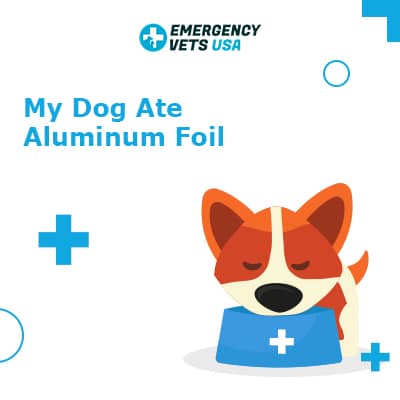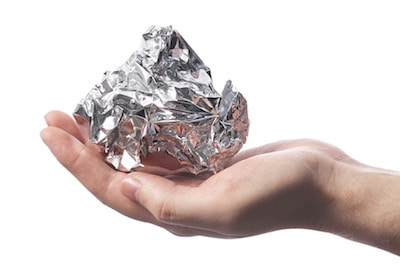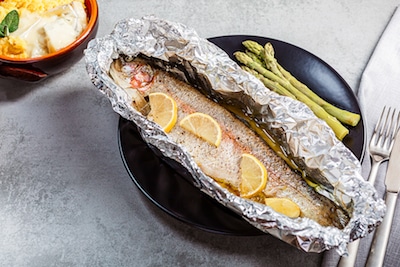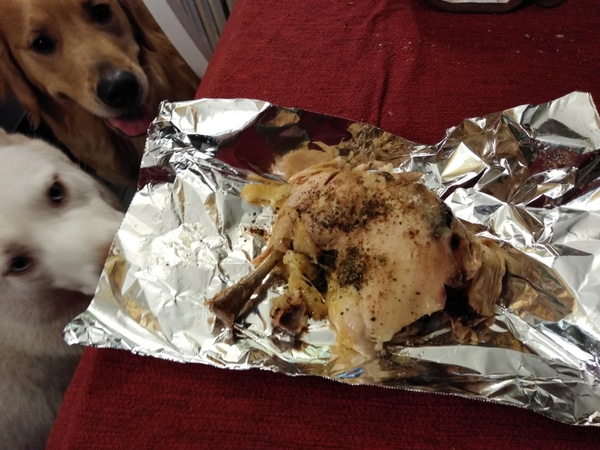My Dog Ate Aluminum Foil – What Do I Do?
Our dogs are known to seek out tasty items that cross their paths.
With so many delicious treats being cooked in or stored in aluminum foil, this causes our pups to accidentally gulp down the foil as well.
So what happens when a dog consumes aluminum foil?
In this article we will discuss what you should do if your dog eats aluminum foil.
We will also dive into the potential dangers of this common household item.
Lastly, we will touch on if this can turn into an emergency health issue for your dog.
Is There A Difference Between Tin Foil and Aluminum Foil?
There seems to be a bit of confusion when discussing the details of aluminum foil.
Whether you refer to the product as tinfoil or aluminum foil, there is no difference between the two.
Due to tinfoil being booted from the market and only offering aluminum foil these days, your household foil will only be of aluminum origin.

While some people may still refer to this product as tin, it is simply a phrase that has seemed to stick as the years have passed.
No matter what you hear when discussing your household foil, it should always be aluminum.
4 Top Dangers For Dogs Who Eat Aluminum Foil
Aluminum foil can be dangerous to our pups for a few reasons.
Though experts state that toxicity is not a huge concern with aluminum foil consumption in dogs, there are other risks that are on the table.
1.) Choking Hazard

Aluminum foil can be a major choking hazard if it is consumed in large amounts.
Aluminum foil can ball up when being chewed, resulting in a serious obstruction in the throat.
Not only can foil be an immediate choking hazard, but it can also cling to your dog’s throat as they attempt to swallow it.
This irritation can cause hacking and coughing, of which can result in serious throat irritation.
2.) Intestinal Obstruction
Since aluminum foil is not meant to be digested, this means it will remain intact within our dog’s intestinal tract.
Whether an accumulation of foil is sitting in the stomach or attempting to move through the intestines, any blockage can result in an obstruction.
An intestinal obstruction is a life threatening emergency that requires surgery to resolve.
3.) Gastrointestinal Upset
While aluminum foil may not cause gastrointestinal upset itself, the food item inside of the foil certainly can.
Since our pups are usually drawn to the foil due to the tasty food that is inside, this often means that aluminum foil can be saturated in fats and seasonings that can cause our dogs harm.
Even a small amount of fatty food can result in GI upset in dogs, this possibility is always on the table.
4.) Potential Toxicity
While most veterinarians acknowledge that a toxicity to aluminum foil is unlikely, you can not rule it out.
There are a few cases of dogs experiencing negative effects due to ingesting aluminum, but this was in situations of the dog consuming a large amount.
Though this possibility is rare, you never want to test it.
Signs Of Complications In Dogs That Eat Aluminum Foil

If you have a canine companion that loves to get their paws on things they should not, it is important to be aware of the possible complications that aluminum foil can cause.
To help prepare you for any aluminum foil emergency, let’s go into some of the signs of complications due to aluminum foil ingestion.
- Coughing or hacking
- Signs of distress
- Vomiting
- Abdominal pain
- Constipation or difficulty passing stool
- Lack of appetite
- Lethargy
If your dog is displaying any of the symptoms we mentioned above, it is best to contact your veterinarian as soon as possible.
Where To Get Help If Your Dog Ate Aluminum Foil
If your dog has consumed any amount aluminum foil, it’s best to reach out to your veterinarian.
They are the best equipped to offer you advice based on your dog’s situation.
While some online pet health forums suggest waiting it out and monitoring for any symptoms, we always suggest contacting your veterinarian to be safe.
This is especially true due to the possibility of intestinal blockage.
What To Expect At The Veterinarian’s Office
If your veterinarian suggests bringing your pup into the office to be checked out, there are a few things you can expect.
Though each visit may vary based on your clinic of choice, there is generally a standard of care when it comes to aluminum foil consumption in dogs.
First, it is important to be aware of how much foil your dog actually consumed.
Since this will greatly impact the treatment and diagnostics of choice, it’s best to try your best to recreate the scenario.
You can recreate the situation by either guessing how much foil was used to cover an item and bringing that amount into the clinic, or actually covering up the item that your dog consumed.
By doing this, your vet can have a better idea of how much foil is inside of your dog’s body.
If your dog just ate the foil and did not eat enough to cause a major choking concern, your vet will likely induce vomiting.
They will do this by giving them an injection that causes them to become nauseous, and checking for foil once the vomit is produced.
If you are both confident that your dog has vomited all of the foil, your pup is usually free to go without issue.
If your dog did not recently consume the foil or is already displaying symptoms of foil consumption complications, your veterinarian may recommend x-rays.
X-rays can often pick up foil on imagine, as well as show evidence of any obstructive patterns.
Based on what is seen on x-rays, your veterinarian can determine the best approach.
If your dog is experiencing an obstruction that your veterinarian does not think will pass on its own, the most common treatment options involve surgery or an endoscopy.

After Care For Dogs Who Eat Aluminum Foil
If your dog eats a small amount of foil that your veterinarian is not concerned about, there is some basic aftercare that you should be aware of.
Though your pup may not experience any serious symptoms, it is best to keep a close eye on them in the days that follow.
One of the things you will want to monitor over the next 48 hours is your dog’s bowel movements.
Since you will want to ensure that your dog is able to pass the aluminum foil, you should watch for any foil in their stool.
If you do not see any foil in their stool as the days pass, you may want to contact your vet.
You will also want to monitor your dog’s appetite in the days following their foil consumption.
Since many dogs shy away from their food when they are feeling nauseous, their appetite can be an indicator of any possible complications.
Final Thoughts
Aluminum foil can cause problems for our canine friends, so it is best to keep it away from your pup at all times.
Be sure to review the information we discussed above, and you will know exactly what to do if your dog ever gets their paws on aluminum foil.

My name is Amber. I am a dedicated animal lover that turned my passion into my career. I am a Licensed Vet Tech with 12 years of experience in veterinary medicine, but I recently took my career online to help spread accurate information on animal care. With how vast the online world is, I have a strong desire to ensure that the reader always walks away with helpful pet advice. With the experience I’ve gained from my time in this field, I have been able to travel the world, offering my services to as many animal rescues as I can find. If I am not at my laptop, or back home visiting family, you can find me somewhere in the world, cuddling every furry friend that I can find! More About Us
